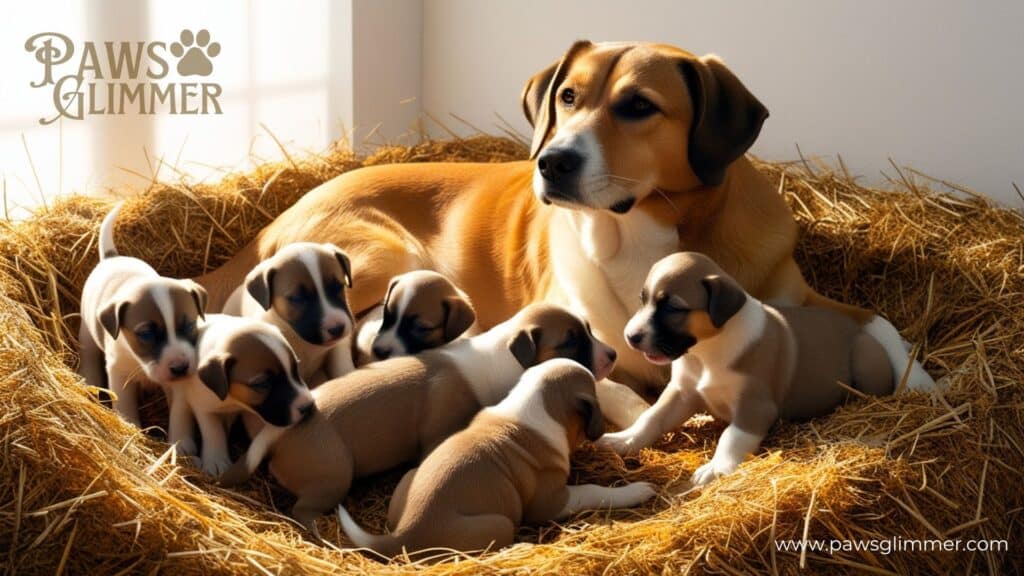Why Mom Dogs Might Eat Their Puppies & Tips🐾 Canine maternal behavior is usually a beautiful thing to witness. However, sometimes nature takes a dark turn when mother dogs eat their puppies. This shocking behavior, while disturbing, isn’t as rare as you might think. 😟
In this comprehensive guide, we’ll explore the reasons behind this unsettling phenomenon and provide valuable tips to prevent it. Understanding the causes can help ensure the well-being of both the mom and her puppies. 🐶👩⚕️
The Shocking Reality of Canine Infanticide
When a mother dog eats her puppies, it’s called canine infanticide. This behavior can be heartbreaking for dog owners and breeders alike. But before we judge these canine moms too harshly, it’s crucial to understand that this behavior stems from complex instincts and environmental factors.
Evolutionary Roots: Understanding the Wild Origins
To grasp why a mother dog might eat her puppies, we need to look back at their wild ancestors. In nature, survival of the fittest is a harsh reality.
Survival of the Fittest in Nature
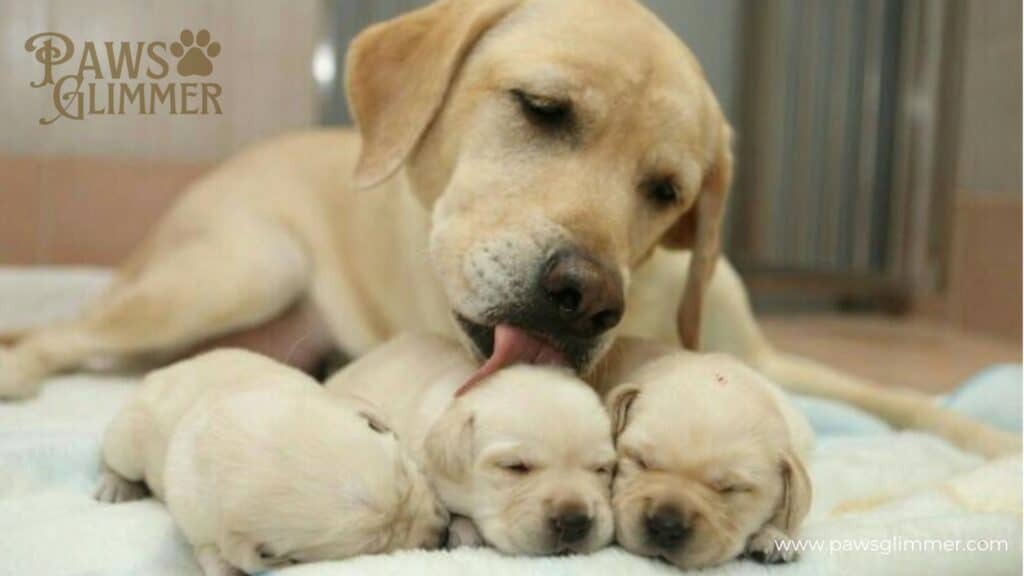
Wild canines face numerous challenges in raising their young. Food scarcity, predators, and harsh environments all threaten a litter’s survival. In some cases, consuming weak or sickly pups might have been a way to:
- Conserve resources for healthier offspring
- Prevent attracting predators with the scent of sick puppies
- Recycle nutrients to support the mother’s health and future litters
Do Jackals Attack Humans? Living in Fear!
Resource Management in Harsh Environments
In the wild, every calorie counts. A mother wolf or wild dog might eat stillborn or weak puppies to:
- Regain energy lost during pregnancy and birth
- Produce more nutritious milk for surviving pups
- Reduce competition for limited resources
While domestic dogs live in much more comfortable environments, these ancient instincts can still surface under certain conditions.
Maternal Instincts Gone Awry: Biological Factors
Several biological factors can contribute to a mother dog eating her puppies. Understanding these can help us prevent such incidents.
Hormonal Imbalances Post-Birth
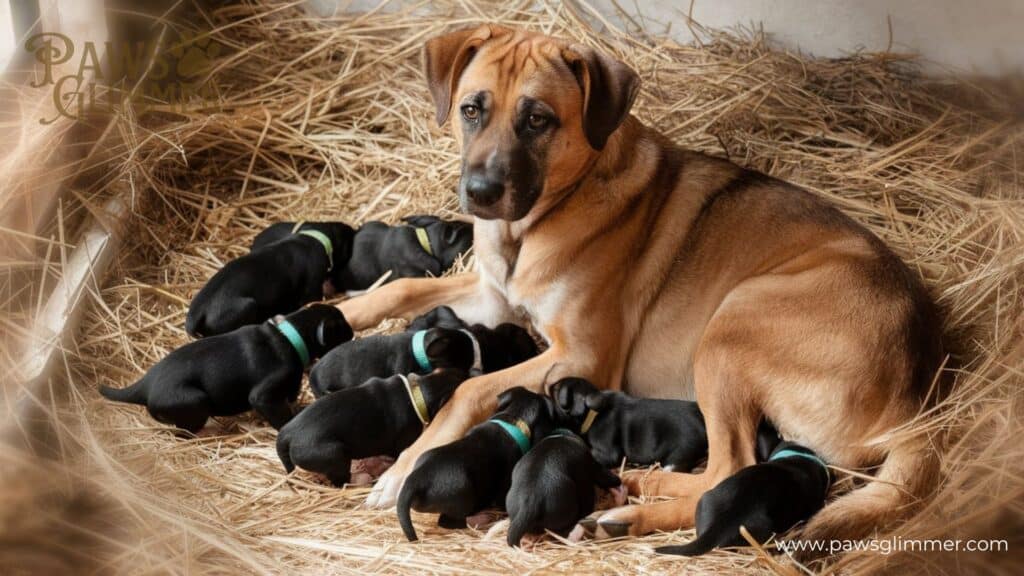
After giving birth, a mother dog experiences significant hormonal changes. These fluctuations can sometimes lead to:
- Confusion
- Aggression
- Lack of maternal instinct
In rare cases, these hormonal imbalances might cause a mother to view her puppies as prey rather than offspring.
Inexperienced First-Time Mothers
First-time canine mothers, especially if they’re young, may not know how to care for their puppies properly. This inexperience can lead to accidental harm or, in extreme cases, intentional cannibalism.
Do Pandas Attack Humans? Cuddly Yet Deadly?
Genetic Predisposition to Aggressive Behavior
Some dog breeds are more prone to aggressive behavior than others. This genetic predisposition can extend to maternal aggression. Breeds that may be more likely to exhibit this behavior include:
| Breed | Risk Level |
|---|---|
| Chihuahua | High |
| Jack Russell Terrier | Moderate |
| Labrador Retriever | Low |
| Golden Retriever | Very Low |
It’s important to note that individual temperament varies widely within breeds, and proper training and socialization can mitigate these risks.
Stress and Confusion: Environmental Triggers
The environment plays a crucial role in a mother dog’s behavior towards her puppies. Stressful conditions can trigger infanticidal tendencies.
Noisy or Chaotic Whelping Areas

A calm, quiet whelping environment is essential for a mother dog and her puppies. Loud noises, frequent disturbances, or too much activity can stress the mother, potentially leading to aggressive behavior.
Tips for creating a calm whelping area:
- Choose a quiet room away from household traffic
- Use soft lighting
- Provide comfortable bedding
- Limit visitors during the first few weeks
Too Much Human Interference
While it’s tempting to constantly check on new puppies, too much human presence can be stressful for the mother dog. This stress might cause her to:
- Become overly protective
- Feel threatened
- Act aggressively towards her puppies
Lack of Proper Nutrition During Pregnancy and Nursing
A well-fed mother is less likely to view her puppies as a potential food source. Ensuring proper nutrition before, during, and after pregnancy is crucial.
Key nutrients for pregnant and nursing dogs:
- High-quality protein
- Calcium
- Omega-3 fatty acids
- Folic acid
- Iron
Medical Reasons Behind Puppy Consumption
Sometimes, medical issues can drive a mother dog to eat her puppies. Recognizing these conditions early can prevent tragedy.
Mastitis: When Nursing Becomes Painful

Mastitis is an infection of the mammary glands that can make nursing extremely painful for the mother dog. This pain might cause her to reject or even harm her puppies.
Signs of mastitis:
- Swollen, red, or warm mammary glands
- Discolored or bloody milk
- Fever
- Lethargy
Eclampsia: Calcium Deficiency Leading to Erratic Behavior
Eclampsia, also known as milk fever, is a dangerous condition caused by low blood calcium levels. It can cause:
- Muscle tremors
- Seizures
- Confusion
- Aggressive behavior
Proper nutrition and calcium supplementation under veterinary guidance can prevent this condition.
Canine Postpartum Depression: Yes, It’s Real
Just like humans, dogs can experience postpartum depression. This condition can cause:
- Lack of interest in the puppies
- Aggression towards the litter
- Self-harm behaviors
Early intervention and medication can help manage canine postpartum depression.
Instinctual Responses to Unhealthy Puppies
Mother dogs have a strong instinct to protect their litter as a whole, sometimes at the expense of individual puppies.
Identifying and Eliminating Weak Offspring
In nature, weak or sickly pups can threaten the survival of the entire litter. A mother dog might eat these puppies to:
- Prevent the spread of disease
- Conserve resources for healthier puppies
- Protect the litter from predators attracted by a weak pup’s cries
Stillborn Puppy Removal
Mother dogs often eat stillborn puppies. This behavior serves several purposes:
- Keeps the whelping area clean
- Prevents the attraction of predators
- Allows the mother to focus on living puppies
Avocado Dosage Fatal to Dogs: What You Need to Know?
Congenital Defects Triggering Rejection
Puppies with severe congenital defects might be rejected or eaten by their mother. This harsh reality is nature’s way of ensuring the survival of the fittest.
Accidental Ingestion: When Good Intentions Go Wrong
Sometimes, what looks like intentional puppy consumption is actually an accident.
Overzealous Cleaning of Newborns
Mother dogs instinctively clean their newborn puppies by licking them. This stimulates breathing and promotes bonding. However, an inexperienced or overly anxious mother might accidentally injure a puppy during this process.
Mishandling of the Placenta and Afterbirth
It’s normal and beneficial for a mother dog to eat the placenta after giving birth. This behavior:
- Provides nutrients
- Helps stimulate milk production
- Keeps the whelping area clean
However, an inexperienced mother might accidentally eat a puppy while consuming the afterbirth.
The Role of the Father: Male Dogs as a Threat
While we often focus on the mother dog, it’s important to remember that male dogs can also pose a risk to puppies.
Territorial Behavior Towards Puppies
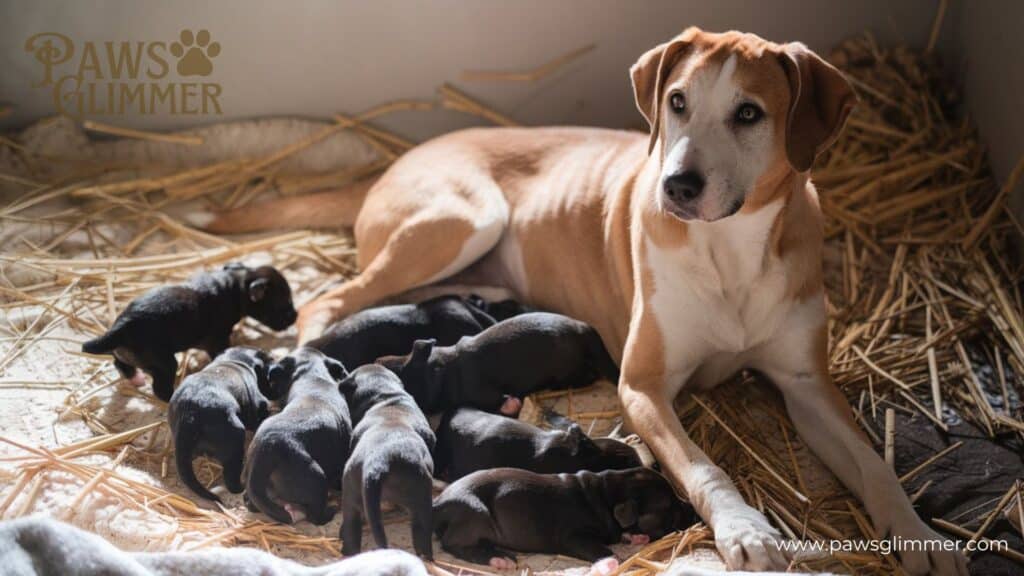
Some male dogs view puppies as intruders in their territory. This can lead to aggressive behavior, including:
- Growling at puppies
- Attempting to chase them away
- In extreme cases, attacking or killing puppies
Lack of Paternal Instincts in Some Breeds
Unlike some animals, male dogs generally don’t play a significant role in raising puppies. Some breeds are known for being particularly indifferent or even hostile towards puppies:
- Siberian Huskies
- Alaskan Malamutes
- Some terrier breeds
It’s generally safest to keep male dogs separated from newborn puppies unless closely supervised.
Prevention Strategies: Safeguarding Your Litter
Preventing a mother dog from eating her puppies requires a combination of proper care, environmental management, and vigilance.
Creating a Calm, Secure Whelping Environment
A stress-free whelping area is crucial for the mother dog’s comfort and the puppies’ safety.
Essential elements of a good whelping area:
- Quiet location
- Comfortable temperature (around 70°F)
- Soft, clean bedding
- Easy access to food and water
- Limited human traffic
Proper Nutrition Before, During, and After Pregnancy
A well-nourished mother dog is less likely to view her puppies as a food source. Consult with your veterinarian about:
- High-quality puppy food for pregnant and nursing dogs
- Appropriate calcium supplementation
- Feeding schedule adjustments
Regular Veterinary Check-ups Throughout Gestation
Regular vet visits during pregnancy can catch potential issues early. Your vet can:
- Monitor the mother’s health
- Provide necessary vaccinations
- Advise on nutrition and supplements
- Prepare for potential complications
Monitoring for Signs of Stress or Illness in the Mother
Watch for signs of stress or illness in the mother dog, such as:
- Loss of appetite
- Excessive panting
- Restlessness
- Aggression towards humans or puppies
Early intervention can prevent tragedy.
Intervention Techniques: When to Step In
Sometimes, despite our best efforts, intervention becomes necessary to save puppies’ lives.
Recognizing Warning Signs of Potential Puppy Harm
Be alert for signs that a mother dog might harm her puppies:
- Growling or snapping at puppies
- Refusing to nurse
- Attempting to bury or hide puppies
- Excessive rough handling of puppies
Safe Separation Methods for At-Risk Litters
If you suspect the mother might harm her puppies, consider these steps:
- Consult your veterinarian immediately
- Set up a warm, safe area for the puppies
- Remove puppies gradually, allowing nursing sessions under supervision
- Consider fostering with another nursing dog if available
Hand-Rearing Puppies: When It Becomes Necessary
In extreme cases, you may need to hand-rear the puppies. This involves:
- Feeding special puppy formula every 2-4 hours
- Keeping puppies warm (around 90°F for newborns)
- Stimulating elimination after each feeding
- Gradually introducing solid food around 3-4 weeks
Hand-rearing is challenging but can save puppies’ lives when necessary.
Breed-Specific Considerations
Different dog breeds may have varying tendencies towards maternal aggression or puppy care.
Breeds More Prone to Maternal Aggression
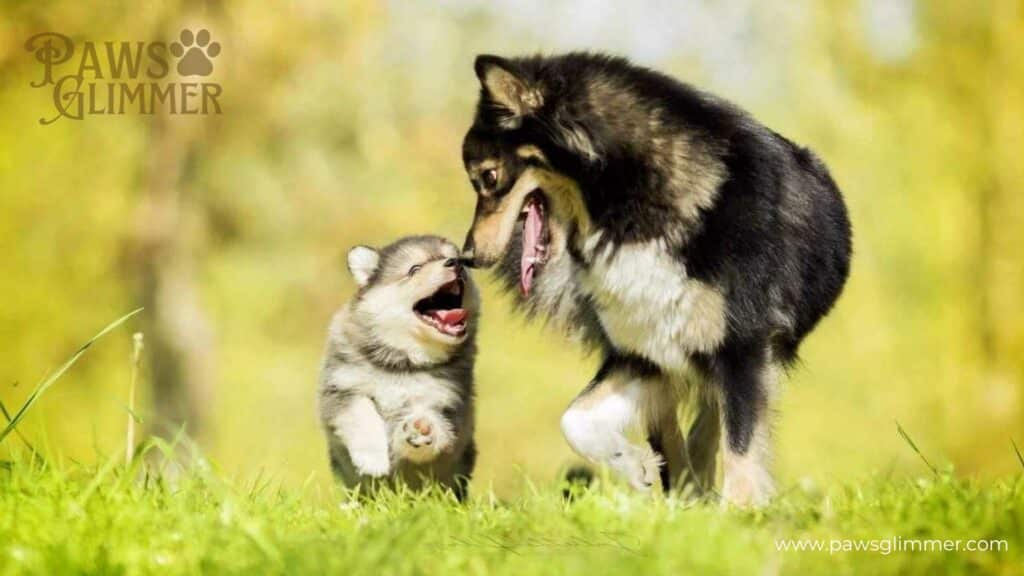
Some breeds are known to be more prone to maternal aggression:
- Chihuahuas
- Miniature Dachshunds
- Jack Russell Terriers
However, individual temperament varies widely, and proper socialization can mitigate these tendencies.
Impact of Selective Breeding on Maternal Instincts
Centuries of selective breeding have altered many dogs’ natural instincts. Some breeds, like Golden Retrievers and Labrador Retrievers, are known for their excellent maternal instincts. Others may need more support and monitoring during the whelping and puppy-rearing process.
The Psychological Impact on Dog Owners
Witnessing a mother dog harm her puppies can be traumatic for owners and breeders.
Coping with the Loss of Puppies
Losing puppies, especially in such a shocking way, can be heartbreaking. It’s important to:
- Allow yourself to grieve
- Seek support from other dog owners or breeders
- Consider professional counseling if needed
Understanding It’s Not Your Fault
Remember that canine infanticide is often driven by instinct or medical issues beyond your control. While prevention is crucial, sometimes these tragic events occur despite our best efforts.
Expert Insights: Veterinary Perspectives on Canine Infanticide
Veterinary research continues to shed light on the complex issue of canine infanticide.
Latest Research Findings
- The role of oxytocin in maternal behavior
- Genetic markers for maternal aggression
- The impact of early socialization on maternal instincts
Professional Recommendations for Breeders
Veterinary experts recommend:
- Thorough health screening before breeding
- Proper nutrition and supplementation during pregnancy
- Creating a low-stress environment for whelping and puppy-rearing
- Early socialization for potential breeding dogs
- Careful selection of breeding pairs based on temperament
Conclusion: Balancing Nature and Nurture in Canine Breeding
While the phenomenon of mother dogs eating their puppies is distressing, understanding the underlying causes can help us prevent it. By providing proper care, nutrition, and a stress-free environment, we can support mother dogs in raising healthy, thriving puppies. Remember, when in doubt, always consult with a veterinarian or experienced breeder for guidance.
FAQs: Addressing Common Concerns About Mother Dogs and Their Puppies
- Q: How common is it for mother dogs to eat their puppies?
A: While exact statistics are hard to come by, it’s relatively rare in domestic settings with proper care. However, it’s more common in stressful environments or with inexperienced mothers. - Q: Can a mother dog that has eaten puppies before be bred again?
A: It’s generally not recommended. The behavior might be due to genetic factors or learned responses that could recur in future litters. - Q: How long should puppies stay with their mother?
A: Ideally, puppies should stay with their mother for at least 8 weeks to ensure proper socialization and weaning. - Q: Is it normal for a mother dog to carry her puppies in her mouth?
A: Yes, this is normal behavior. Mother dogs often carry their puppies to move them to a safer location or to encourage them to return to the nest. - Q: How can I tell if a mother dog is rejecting her puppies?
A: Signs of rejection include refusing to nurse, ignoring puppies’ cries, spending time away from the litter, or showing aggression towards puppies.
Remember, responsible breeding and attentive care are key to preventing tragic outcomes and ensuring the health and safety of both mother dogs and their puppies.

Raymond Dandan is a seasoned pet blogger with a passion for feline care and behavior. With years of experience and a deep love for cats, Raymond brings expert insights and practical tips to “PawsGlimmer.” His engaging writing and thorough research help cat owners provide the best for their furry friends, making him a trusted voice in the pet community.

